#I have learned so much from tumblr
Explore tagged Tumblr posts
Text
was recently having talks about saving up for a several-week vacation with my partner and he said something that i seriously cannot stop thinking about and i need to Ask The Audience
this is not cumulative, you must have spent over 14 calendar days outside of your hometown in one stretch to be able to hit Yes
i’ve never asked for this before but if you could rb for reach that’d be cool, this is a straight up potential worldview-shattering revelation right here and i need data if im gonna shatter my dang worldview
#i have traveled so much and lived in several places that it just fucking. knocked the wind outta me#to learn he’s never been away from this city in his ENTIRE LIFE for more than 2 weeks#when he saw my shock he said he thinks it’s more common than i’m assuming#so i’m very curious to see how accurate that is#kenposting#poll#tumblr polls
5K notes
·
View notes
Text
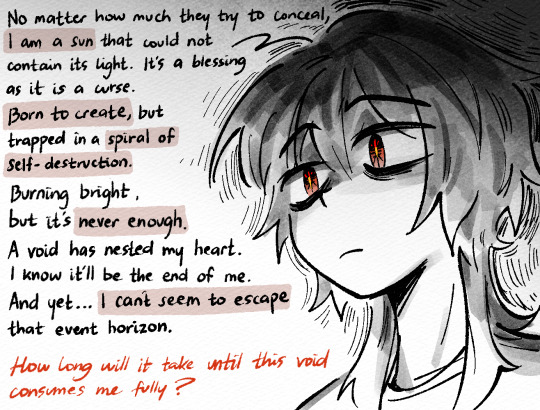
consumed by the inevitable
#messyr#you know- I kept thinking: One day. The cage will be open but I feel like I'll stay. Because if I run- I'd wind up dead from their bullet#so I just- tend to- follow as much as I want to rebel and put sense into this fuckass household. I hate seeing the others in pain as well#and it hurts more that it feels like I can NEVER be the one to break this cycle of abuse- when I knew from the start- when I knew too much#but here I am ending up like the rest of them- helpless and unable to do jackshit about the situation. I cant say or do anything at all!#I dont want to end up like them- if anything I want to BREATHE- i want all of us to LIVE without this pain that has existed for generations#I want to help so bad no matter how much I know I am unloved.#no matter how much hate i carry- no matter how much burden- Underneath it all- I'm devoted to them- that's how fucked up I am#i know i'll never be enough. I know how often I think of death and wish it.#But I have a dream to achieve and I am not planning to die until I reach it. Not yet. If pain is where I strive best then so be it.#doodle#vent art#artists on tumblr#bpd#toxic behavior#learned helplessness
545 notes
·
View notes
Note
What are your thoughts on gender in the wizarding world? Do you think there’s a strong patriarchy, and if so how do you think it formed?
I feel wobbly about how powerful patriarchy would be in the wizarding world before answering this question. let's see what conclusion i come to lol
table of contents—you could skip to gender in the text if you don't want the connections to the real world and don't need the foundational ideology of my argument
1: where did patriarchy originate in the real western world? & what assumptions am I working off of?
2: gender in late medieval and early modern england & western europe
3: gender in the text 3.1: younger women 3.2: older women
4. conclusions
1. where did patriarchy originate in the real western world? & what assumptions am I working off of?
mona eltahawy called patriarchy "the oldest form of occupation", speaking to the way women & people classed as women (or gender deviant or ungendered) are treated as commodities to own. this BBC article argues that patriarchy was created as a way for the proto-state to leverage control over the population. the enforced social roles of males soldiers & female reproducers made groups bigger & more powerful.
I will take the article's assertion (it's very well sourced) that one of the first instances of patriarchy developing starts about 5,000 ago in Mesopotamia, when records show women disappearing from public life, at face value. then, ofc, in the mediterranean world we "soon" after see the Mycenaeans & Greeks & Romans, in that order, develop, all of which had patriarchal societies—tho to different extents.
as I have stated previously, the wizarding world loves Greek & Roman shit, as does the real western world (and we have! for centuries!). I like to consider their cultural norms, especially as they were interpreted during the Renaissance, when thinking about wizarding culture.
so, yes, the WW is patriarchal, since for at least 1,500 years, but probably more like 4,800 years. and for most of that time there was no wizarding world, just the World, and the WW had the same histories as the muggle world.
2. gender in late medieval and early modern england & western europe
so sorry, you've unlocked an info dump cutscene. it can be skipped.
I want you to imagine the traditional gender roles for men and women in western society. write them down, even. what should women be like? what is the inherent nature of women, if one exists, according to traditionalists? according to society at large? according to you?
in early modern england there was a HUGE shift in the perception of women and gender roles.
in "'The Good and Bad of that Sexe': Monstrosity and Womanhood in Early Modern England," by Alletta Brenner, the epistemological history of womanhood in the middle of the sixteenth to the end of the 17th centuries, is analyzed.
epistemology is about the study of knowledge, so think intellectual history, a history of what ideas and thoughts people are sharing and the patterns of those ideas and thoughts.
long story short: for about 1500 years, western culture regarded women as lesser versions of men, who are the perfect form of humans. male and female were not regarded as opposite, but two versions of the same thing. eve was made from adam’s rib, she’s a knockoff.
“Monstrosity and Womanhood” discusses two cultural differences between then & now that are significant to my argument. 1: people of the middle ages & early modern europe regarded the monstrous as a part of God’s creation, possibly frightening, but not unnatural. 2: women were regarded as too sexually driven, lustful temptresses. this is a stark contrast to the Cult of True Womanhood that we see in the 19th c, submissive, gentle, spiritually included, a soft place for her husband to find comfort in after being in the chaos of the outside world.*
(lily kind of embodies the late middles ages dangers of womanhood & it’s monstrosities in earth after rain.)
so, the answer to “what is a woman?” is changing rapidly right before the WW cuts itself off from the MW. I expect that, since the bio-essentialism of today started in the 19th century, post SoS, there is a significant difference in what the WW settles on.
the changing views on women in the MW are also influenced by and/or create the atmosphere wherein the witch trials are born. midwives and other women who transgressed their gender roles were targeted in the witch trials. the WW reacts to the witch trials by going into hiding (I don't believe this, I think it's part of the WW historical mythos used to uphold their society & it's fucking issues)
*this ideal of womanhood is only accessible by white middle and upper class women. other women are in many ways, monstrous, but they are also degendered.
3. gender in the text
in the books we see multiple examples of sexism, and a large chunk of these examples involve over-sexualization or sexual policing. our entry into WW culture, ron weasley, displays these views multiple times. he does not seem to believe that women are less intellectually or even less physically capable. he also doesn’t have a problem being defended by harry potter or hermione granger, or defending harry or hermione.
3.1 younger women
the threat of love potions is also brought up a few times throughout the books, and they are solely seen as a woman's weapon.
in Goblet of Fire, once skeeter turns on hermione, she asserts in a PUBLIC NEWSPAPER that hermione is possibly using love potions to seduce powerful men (pg 357). this is after harry's friendship with hermione is portrayed, again, in a public paper, as a romance (pg 225). hermione is pretty and smart when she's "with" harry, but when she is associated with a second man, thereby betraying the englishman who must be the hero of skeeter’s stories, she's ugly and smart enough to drug him. mrs. weasley, an adult woman and frequent caretaker of hermione, believes this and is cruel to her, a child.
over sexualization is used as a highly effective weapon against hermione. the WW easily accepts a young woman's sexuality as a threat to the men around her; she is voracious. i'm sure hermione being muggle born does not help.
merope gaunt is also accused, by dumbledore, of drugging tom riddle sr. with a love potion (pg 154 HBP). no evidence is given. we, the reader, are meant to assume the accuracy since dumbledore is making the claim. once again the sexual appetite of a young woman is dangerous. her misdeeds, brought about by choices made clouded with lust, only the short term considered, end up creating a fucking super villain. what's interesting is that this isn't only a belief of the characters in-text, it's the perspective of the author. nonetheless, dumbledore's quickness to blame a young woman's desire for driving her to violence and bringing misfortune, indicates that the sexuality of women in the WW is easily seen as dangerous.
i think this well establishes women's sexuality as a dangerous, insatiable threat in the WW culture. this is clearly a patriarchal ideology. the systematic reinforcement at the nuclear family level becomes clearer when we look at how the weasley brothers treat ginny's sexuality. they, just as men in the MW do, see their sister's sexuality as their business. however, this is not because men are a threat, but because ginny is unrestrained in her expression and exploration of her sexuality. I do not recall anyone ever worrying for ginny’s safety—women are competent and intelligent enough to defend themselves.
here are two instances from HBP where we see the brothers judging their sister and trying to control her sexuality:
fred and george are selling love potions, but not to ginny, because she's used her wiles to collect enough men. ron is also reporting on ginny’s romantic endeavors to their older, of age, brothers (pg 91 HBP). Is this to leverage additional power and to control her? Later in the book ron doesn't want people to see ginny engaging in sexual behavior because of what they might think of his sister (pg 204). being a slut is bad in the WW too. :/
So, the two young women we focus on the most have their sexuality picked apart and policed.
3.2: older women
What of the older women?
There are women in positions of authority in the WW, but most of the women who work and have positions of authority are not mothers in canon. The women with the most authority, mcgonagall, umbridge, arguably amelia bones though she is tertiary, are not mothers and remain, in canon, romantically unattached. pre-fudge there is a woman minister, who i imagine was put into power as a part of the glass cliff phenomenon, when shit hits the fan, women are more likely to be hired to oversee the shit hit everyone, and then be blamed.
Marriage & motherhood remove agency. The important mothers of the series, lily, petunia, narcissa, molly, to a lesser degree alice and tonks, do not have children until they are married. Half of them definitely do not work. two have jobs, tonks and alice, and they + lily are in the order, activities unspecified.
The lack of women occupying both domestic and public spaces indicates patriarchal control. There are two options. The married mothers we see occupying both spheres are all taking part in the public sphere with their husbands. Even tonks, who works were remus does not, is in the order with him. Mothers & wives are not unchaperoned.
It is also notable how young people are when they get married and have children. This is explained by war in the text. I posit that it’s actually another element of the patriarchal control of women’s sexuality. Since women are insatiable, those that are linked to a man must be kept under a higher level of control to ensure she stays loyal to her husband. Marriage in the teen years is younger than the average in MW in the 1970s (22.8 for women, 25.1 for men). the average age of women entering into their first marriage has consistently been 24 or older in england and wales since the 1550s—it dropped in the 1950s and 60s.
Sidenote—during WW2 the age of marriage in the UK seemed to stagnate, and then it dropped at the conclusion of the war.
We don’t have the stats for the WW, but we know james and lily married and had harry before 21, we know from the black family tree that narcissa had draco at the average age of marriage in 1970s MW UK, which indicates a younger marriage. We do not know alice and frank’s ages. tonks actually meets the average age for women in the UK in the mid 90s, but her husband and she are half bloods. it is possible that the average age of marriage in the WW is younger than the MW, especially among the upper classes.
4. conclusion
The main element of patriarchy in the WW is control of women’s sexuality, because women are too promiscuous to control themselves, and this poses multiple dangers. Love potions, pursuing a man to near death, tarnishing the family name, etc. This has created cultural norms of younger marriage and women, especially upper class women, not working outside of the home once they are married. Women who choose not to tie themselves to a man through marriage may be seen as inherently less sexual, as adult women who do not marry are not put through the same scrutiny as women who express sexual inclinations.
It is possible that we don’t see the scrutiny adult, unmarried women endure because harry is a child the whole time and does not think about his professors getting their backs blown out on the weekends. It is also possible that the women we see, namely umbridge and mcgonagall, put up a non-sexual persona to avoid this scrutiny, a childish feminine and de-sexed school marm respectively. I’d edge my bets towards the latter.
Magic allows a significant portion of reproductive labor to be automated, and in the MW reproductive labor is designated to women and made invisible as an element of maintaining the nuclear family to uphold capitalism. Therefore women in the WW are partially freed from this element of capitalist patriarchy.
Women are not seen as less capable with magic, intellect, or physically, so their voracious sexuality creates a greater threat. The patriarchy in the WW seeks to control their sexualities, but not much else. The desire to keep pure blood families “pure” likely increases the drive to control women’s sexuality in the upper classes. I’m not seeking to make this argument here, but I believe this element of policing would have evolved in the 19th century, parallel to the evolution of the bio-essentialist ideal women of the MW. the reason I am not making this argument here is that this post is long as shit, and making the point requires a lot of details about fascism and the history of the WW and MW.
I do think patriarchy is “weaker” in the wizarding world, but still exists. Due to the SoS and magic much of the modern elements of capitalist patriarchy did not develop in the WW, instead, elements of the early modern patriarchy were carried over and intensified. At the same time, women in the WW always had a level of agency and power unreachable to muggle women, which carried over to the SoS society. Perhaps magical men treated muggle women how we treat marginalized women in the real world, and continued to do so after the SoS ended. Perhaps the WW is a secret upper class that exploits the MW without muggle’s knowledge. Perhaps.
I can’t believe I didn’t talk about the witch trials at all. I have thoughts on those! They are forthcoming when i finish the wizarding world & colonial era meta.
#fun fact i have a history degree that very much focused on the transition from late middle ages to early modern#and i learned generally a historical materialist method of analysis#everything is about using resources to consolidate power#harry potter#hp world#my work#god fuck this is long#and it's so incomplete#sorry about the weird capitalization i wrote half in tumblr drafts and half in google docs#hp meta#m: meta#WWbuilding
86 notes
·
View notes
Text

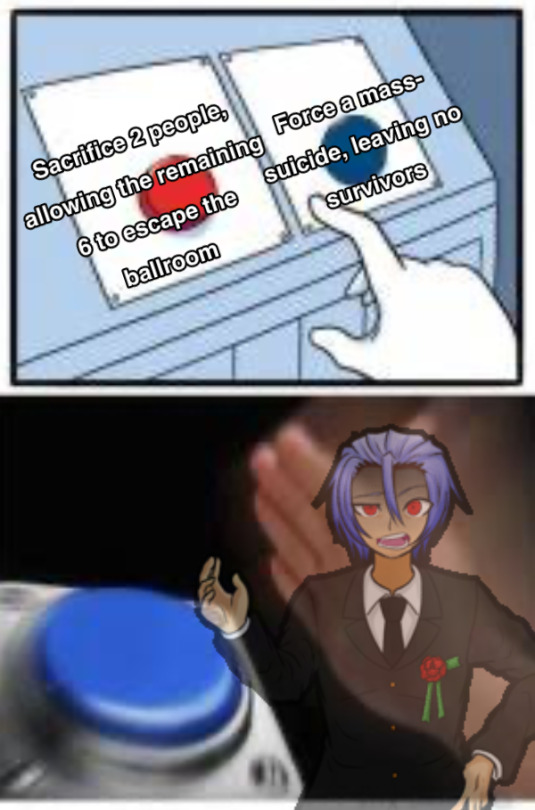
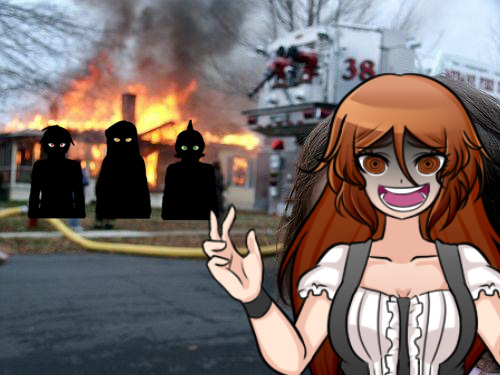
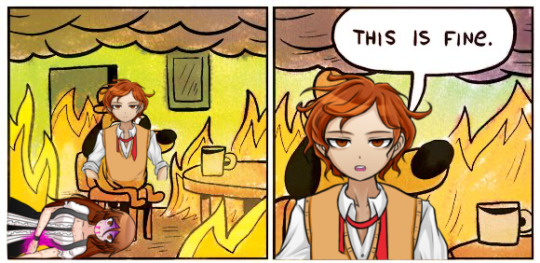

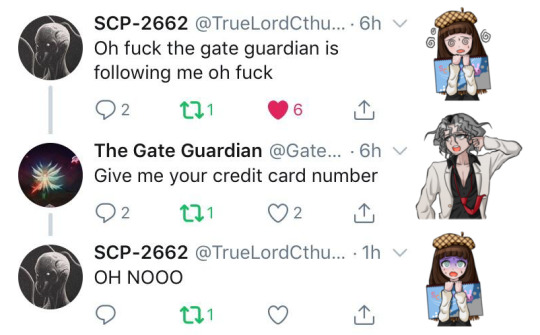
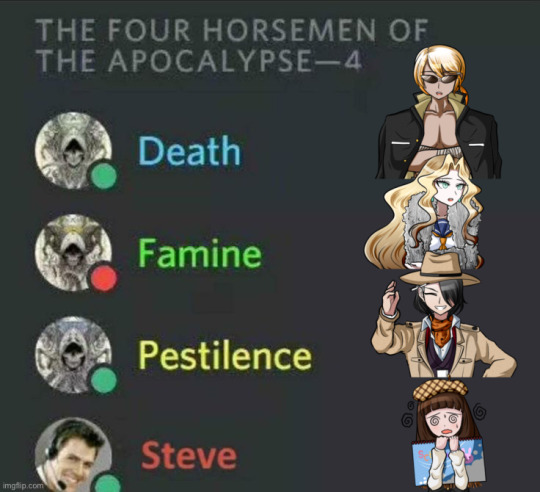
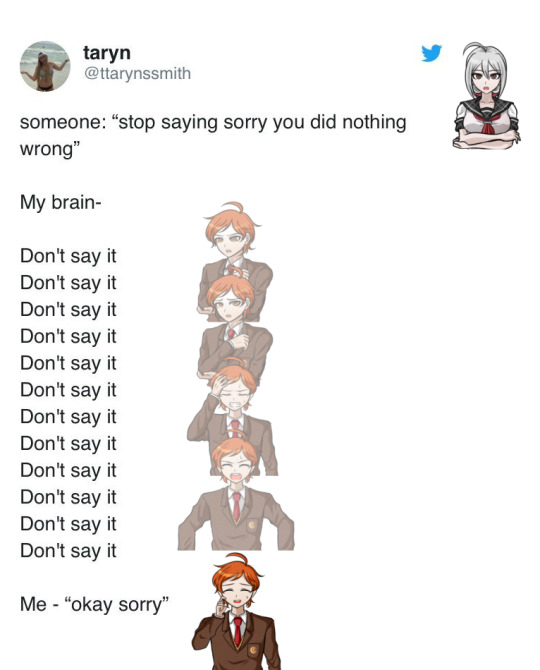
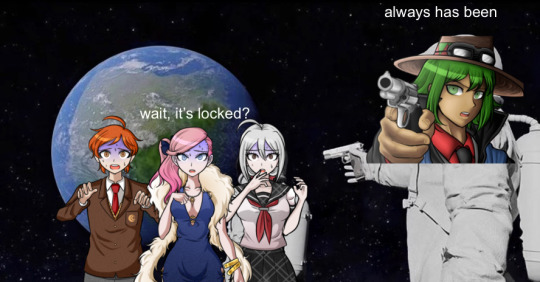
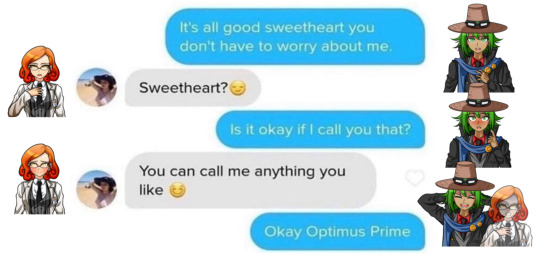
Behold, a mere fraction of my MANY DRA/SDRA2 memes
I have so god damn many from contributing nothing but memes to Reddit and now the people of Tumblr must pay the price
#dra#danganronpa another#sdra2#super danganronpa another 2#kinji uehara#tsurugi kinjo#teruya otori#rei mekaru#kizuna tomori#akane taira#utsuro#hajime makunouchi#emma magorobi#nikei yomiuri#iroha nijiue#syobai hashimoto#yoruko kabuya#yuki maeda#terurei#be warned there will be much terurei from this blog#i love them#ill post more later tumblr has an image limit#also have not learned tumblr courtesy yet#so im gonna assume spamming the tags is not okie dokie
161 notes
·
View notes
Text

contemplating the logistics of eating nasty burger while stuck in a fursuit
#Danny Phantom#fursuiting phantom au#furry#artists on tumblr#spent yesterday learning how to draw badgers in this style#& the past like. 2? 3 hours? doing this. my back hurts#ough ooff wahh remind me to sit at a desk next time i draw#so much easier to trace my lineart on my wacom than my laptop anyways. also i'm less likely to lose pens#i want to do more digital art of this au but traditional is easier for me so. markersssssss. markers & penssssss#fun fact: i use two different greens for the suit & the glow. the glow is a highlighter & the suit is just a lime green marker#i should probably get a new white pen at some point cuz the one i have is kinda unreliable#anyways yeah i know how to draw badgers consistently now so expect more fursuit au lol#also i'm aware the design has changed a bit from the original concept. it probably will change more in the future#i'm just messing around with ideas
22 notes
·
View notes
Text
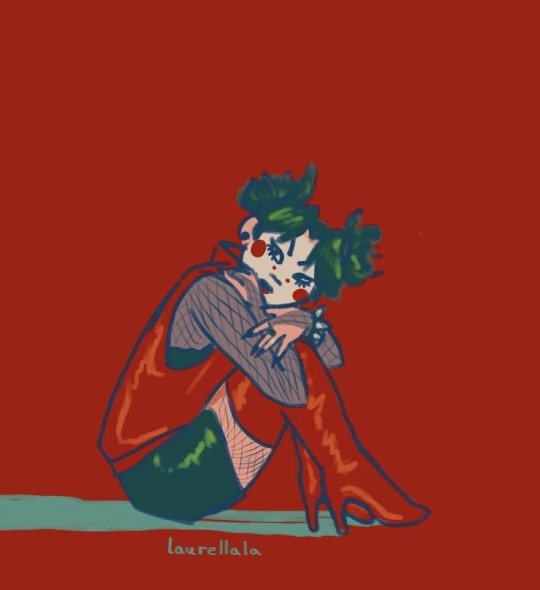
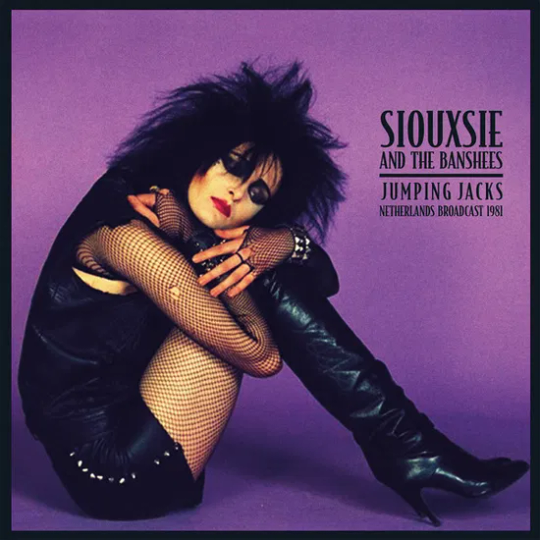
someone said my last rockstar AU marinette reminded them of souxsie and the banshees and I had to follow through
#marinette dupain cheng#miraculous ladybug#miraculous lb#miraculous fanart#miraculous ladybug fanart#miraculous au#miraculous rockstar au#miraculous ladybug rockstar au#artists on tumblr#digital art#i would like to learn more about music I don't know much about souxsie besides she looks so cool but i will have to listen#marinette's vibe is very inspired by show-ya which is a Japanese band from the 80s i discovered recently#and also inspired by kiss because that's the only corpse paint wearing band i grew up knowing ok!!!! be nice
23 notes
·
View notes
Text


Wanted to try my hand at Pre and Mid corruption designs of Shadow Milk!
I KNOW IT’S NOT CANON I KNOW IT’S NOT CANON I JUST WANTED TO HAVE FUN AND BE SILLY
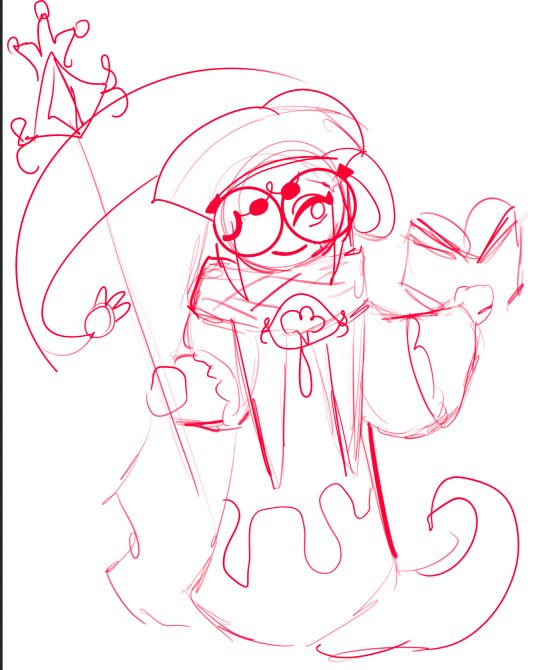

THIS IS WHAT I THINK HE’D ACTUALLY LOOK LIKE AND WHY OKAY??
#I love male whores guys#I think he gets to show a little hip. as a treat#might make. a secondary post about my HCs for his corruption#like either a comic or just a list. depending on how motivated I am#anyway I love body horror and this bitch is no exception#im making his skin curdle off and his guts solidify#anywayyyyyyyyy perhaps corruption as a last resort to stave off the anger of a vengeful god?#crk#teethart#cookie run fanart#cookie run kingdom#fanart#my art#shadow milk cookie#shadow milk crk#shadow milk au#shadow milk fanart#digital art#artists on tumblr#anyway why does PV always get involved with satan parallels who go evil after learning the truth of their creation? /j#only in my au…..#I really should post more about my Crk lore bc I’ve been into this game for 2 1/2 years and I have so much it’s obscene#mostly about the DCK but like. expected from me.
51 notes
·
View notes
Text
i felt out of the loop on "i don't want to be a magical girl" lore so i decided to try and find the first time @kianamaiart posted ab it but i accidentally scrolled down too far so now im making my way thru their college posts.. (which are very cool!!)
#i dont want to be a magical girl#idwtbamg#kiana mai#kiana if you see this i love your art#your posts from college are actually somewhat motivating#i can tell you're going to be a big inspiration for me#can't wait to learn all about idwtbamg#there should be an oldest to newests posts feature on blogs#tumblr pls#i really like deep diving chronologically#but having to scroll is so much work#this is my humble ask tumblr pls and ty
12 notes
·
View notes
Text
You may think you'll remember your current fic ideas but that's the Devil talking... Write. That. Shit. Down.
#mourning all the dammon and rugan fic ideas i had 😭#at least i learned from my mistakes n wrote everything for soap n ghost#but still 😔#rambling into the void#to delete#perso#devil here is used ironically#cod x reader#x reader#bg3 x reader#cod fanfic#writers on tumblr#writer problems#fanfiction#i have lost so much of my writing over the last 15 years between getting my pc stolen and changing devices 🥲#something you never get back 😔
12 notes
·
View notes
Text
I would like to both thank and blame tumblr for the phrase "turn slow tigers into fast tigers with this one neat trick!" Like, I am grateful for it as a mnemonic that stuck that reminds me to go punch the punching bag* when I get too stressed out and can't function well from acute stress, but also I can no longer refer to it any other way because when I get that stressed I have trouble with words Which means today I was putting on my wrap gloves and my brother was looking at me like "what are you doing?" and all I could say was "turning slow tigers into fast tigers" *I think the original post was about taking a short run or tensing all your muscles and then releasing them? But my response to stress is very much not flight lol
#the person behind the yarn#it worked though!! and he's on tumblr so he knew what I meant#are they called wrap gloves? wrist wraps?? hand wraps???#the wraps like you'd wear under boxing gloves but in glove form themselves instead of a long strip of fabric#and with padding on the knuckles#back before I got sick I used to do what was pretty much MMA sparring#in that that was not the specific style we were learning but once a week we had sparring hour#and like half the people that came were MMA dudes#which also means I can say (I find this hilarious but my sister doesn't)#I have only been punched in the face by three people: a toddler. my sister. and a professional MMA fighter#that dude got SO MUCH GRIEF from the rest of the class for even barely hitting my face. it was hilarious#I was probably the youngest person in the sparring group by well over a decade they were super nice#today was my first time hitting the punching bag in like...8-9 months?#I stayed away from it while I was anemic because that seemed a bad idea#and it was great!!! my new meds meant I could use the punching bag for more than like two minutes at a time!#and it didn't skyrocket my heart rate!!! or at least not as badly!!!#so I think I will get back into using it more often
18 notes
·
View notes
Text
i was mopping the house, just mopping the house and suddenly it fucking hit me out of nowhere that i'm actually a legal adult now even tho my birthday was just two days ago hOLY SHIT
#desiblr#desi tumblr#desi girl#i had to sit down for a second#who tf decided turning 18 from 17 had to mean so fucking much i just wanna continue w my life#who said i can drive and i have the brain to vote and i can make decisions for myself and i need a bank account and learn about finances#WHO THE FUCK#i cannot do this
13 notes
·
View notes
Text
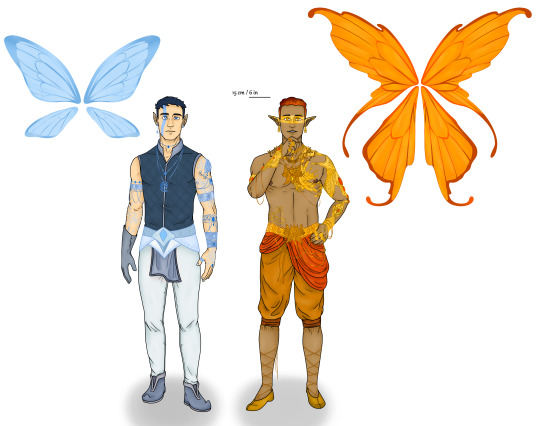
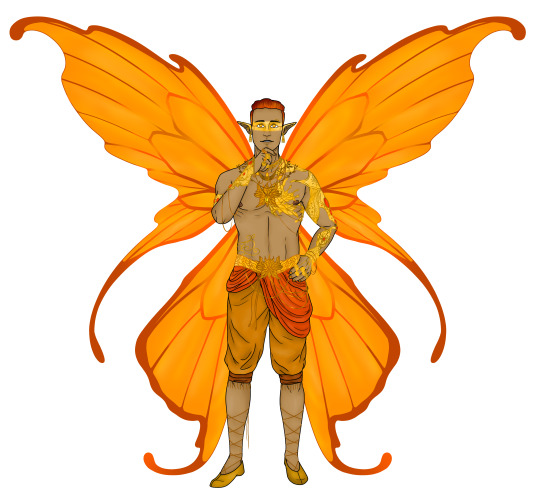
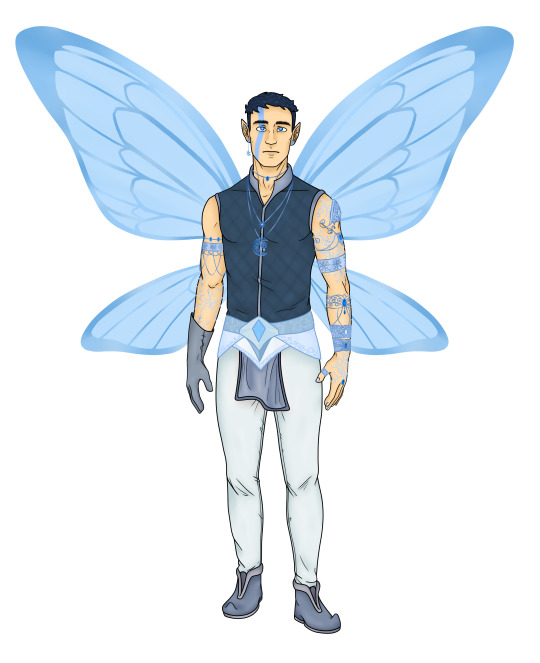
More Detailed versions of what Salim and Jason would look like in the Fairy AU, with Ice Fairy Jason and Fire Fairy Salim
Bonus version under the cut without any face paint and jewellery :)
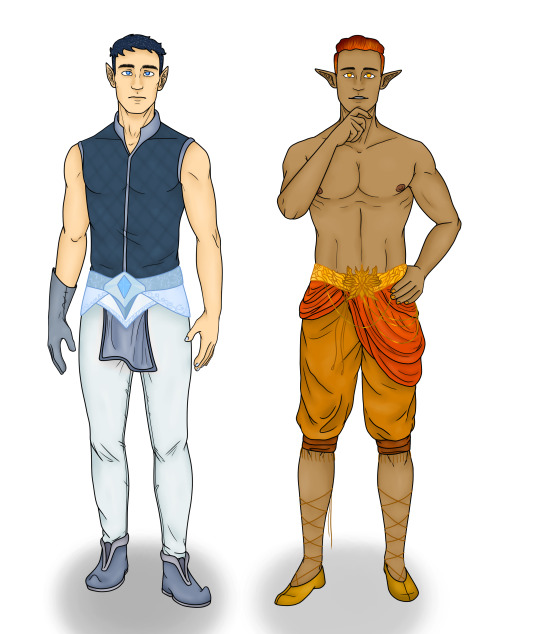
#my art#salim othman#jason kolchek#house of ashes#dark pictures house of ashes#hoa#jalim#jason x salim#fanart#I spent so much time on all of Salim's jewellery and it didn't come out very well :(#I learned drawing fairy wings is a lot harder than I thought it would be#I was going to add a drawing off the steam they'd make from kissing I mentioned in my last post but it didn't work out lmao#No background because I already spent so much time on this when I just planned on sketching their outfits#If I added a background I would have never finished this#Side note: I love drawing fantasy clothes so much#tumblr fucked the quality of these images btw 🙃#Also I'm just realizing I forgot Salim's body hair 😔 sorry king
45 notes
·
View notes
Text

Arrydahlia
Custom Character Reference Sheet for @nyyght. Thank you again so much for your patience and generosity. <3
Commissions are open on Ko-Fi
#warcraft art#world of warcraft#character art#original characters#blood elf#elf#fantasy art#mmorpg#character reference sheet#commissioned work#artists on tumblr#handhourart#This has been in the works for months as a new commission type#But I have learned so much from it and I am excited to potentially do more of this sort
14 notes
·
View notes
Text



he's so happy 🥰🧶
#mine#ts4#sims 4#the sims 4#simblr#sims#ofmd#ed#ofmd sims#man i usually rly limit myself to how much i post in one day#because i dont want to post too much of the same thing#dont want ppl to get bored or oversaturate the dash with sims#but i am rly trying to learn how to relax#because i am the type of person who is super all or nothing (which usually ends on nothing)#but when i AM doing something i go all in and make so much stuff and just......#i am too impatient to space it out i want to share it asap!!!#that is one thing that i like abt tumblr is that i can queue things#and i think other sites should take inspiration from taht tbh#that would make bluesky perfect for me.... gif support#the ability to make a thread as you're typing rather than having to send one post and then reply rinse and repeat#and i know those are probably in the works#i dont imagine a queue is tho but if it was that would be my dream site 😂
9 notes
·
View notes
Text
Affixes, Clitics, and Particles
i think that these parts of language are really cool! so im going to try to explain them :D also i definitely did not get sent down an hours long rabbit hole of linguistic papers and i also definitely didn't find out that the reason i wanted to make this post is actually a misconception :D i love ignoring things :D
Affixes:
the wikipedia article for affixes says that "in linguistics, an affix is a morpheme that is attached to a word stem to form a new word or word form."
in hopefully simpler terms, this basically means that an affix is a letter, or a group of letters that form a single sound or syllable, that is attached to a word stem to form a new word or word form.
some examples of these are the somewhat well known prefix and suffix, but also the beloved infix:
prefix: undone suffix: spotless infix: abso-fucking-lutely
sidenote: my favorite thing about english infixes is that they pretty much only work with expletives. in fact, there's a tom scott video about expletive infixations!
Clitics:
wikipedia defines a clitic as such: "a clitic is a morpheme that has syntactic characteristics of a word, but depends phonologically on another word or phrase."
in layman's terms: a clitic is a letter, or a group of letters that form a single sound or syllable, that has the function of a word in a sentence, but depends on another word or phrase based on the sound rules of the language.
a few examples of clitics can be seen in finnish (which also has a great many affixes but we're not talking about those right now):
-ko/kö -han/hän -pa/pä -kin
the spelling of the clitic depends on vowel harmony. if you want to learn more, this dissertation is all about finnish clitics!
you may be asking yourself how to tell the difference between clitics and other parts of speech. well this study has just the thing for you! quite a few tests are suggested by the author of this study if you want to be able to tell if something is a clitic or not, including some of the following:
a phonological test observe how the clitic forms a phonological unit with an independent word. (do not ask me how this one works i dont know) accentual test "clitics are accentually dependent, while full words are accentually independent." put simply, if you can't put stress on it, it's probably a clitic syntactic test a word can stand on its own and be subject to normal word processes such as tense changes while a clitic cannot do this
Particles:
"'Particle' is a cover term for items that do not fit easily into syntactic and semantic generalizations about the language[.]"
read: "particle" is a miscellaneous, catch all term for anything that doesn't fit into the above two categories (or any other word categories like nouns, verbs, etc.)
the author of this study (who i'm going to refer to as Zwicky from now on because it's easier) says that theres no such thing as a particle and that its distinction from affixes, clitics, words, and clauses is unnecessary. i think thats an. interesting take.
anyway even though Zwicky just said theres no such thing as particles (which, how could he do that? theres kids around! we dont want to ruin the magic!) he concedes that there is actually a group of words that are commonly called particles that he agrees are actually particles. but he decides to call them discourse markers instead. because fuck you.
i dont like any of the words that Zwicky included so i made a list of my own:
-ね (ne) eh (canadian english) innit (common transcription of "isn't it", british english)
the funny thing is im coming out of this still not entirely clear on what a particle is. i thought i knew, i did some research, realized i didnt know, and now i'm here. based on how Zwicky puts it, it feels like the category of "particle" exists to accommodate the fact that there might be words* that arent affixes, clitics, words, or clauses but it feels like Zwicky is just being contrary. I should probably have done more research but this post was supposed to be done 24 hours ago.
out of context highlights from my research process: - sanskrit - the panini rule - doch - verbosely long section titles
*i dont actually mean words, i mean a morpheme which is a letter or a group of letters that form the representation of one sound that carries meaning, but i didn't want to make that sentence long and unreadable
if i'm wrong, please tell me! i would appreciate being corrected, i know i am not an expert on this topic in the slightest.
#i think this post is about to go off the rails.#which will be quite amusing for everyone except me#and then later me in the future [as well].#i think i'm finally done :D#citing is so much easier on tumblr 😔💕#i can just link the source on the words#i dont have to deal with a stupid bibliography#i really feel like with particles i have like net 0 information gained#but hopefully you learned something about clitics and affixes!!#i def learned about clitics because i only had very surface level knowledge before 🤔#i also dont understand any of the properties of particles given in the paper#i also felt very much like “are the properties of particles in the room with us right now”#like i dont think they were listed#granted i did skim the latter half because i was tired and just wanted to get this done#but still :p#also#a note from myself from about an hour in:#linguistics my beloved <3#linguistics
28 notes
·
View notes
Text

creeters 👍👍
#art#my art#artists on tumblr#digital art#pink space#doodles#not great at drawing animal things but by FATE i'm going to learn hbdbshf >:33#//anyway dead race from my story !!!#i must. do more with them hbsh#i have some lore for them but not much#not very key to the story but also it's Kind of important hbshfh#/cuz they don't have hair i think a lot of them tattoo their heads :D#i haven't had any ideas for that yet though so none of that here lol#/also !!!! alphabet :DD#i DO want to turn it into a proper language but you know for now this is alright lol#/very cool very neat look at the lil guys go :DD#can't wait to start making up little clothes for them ehehgh :DDD#//going to finish my viddy now !! toodles ^v^
21 notes
·
View notes